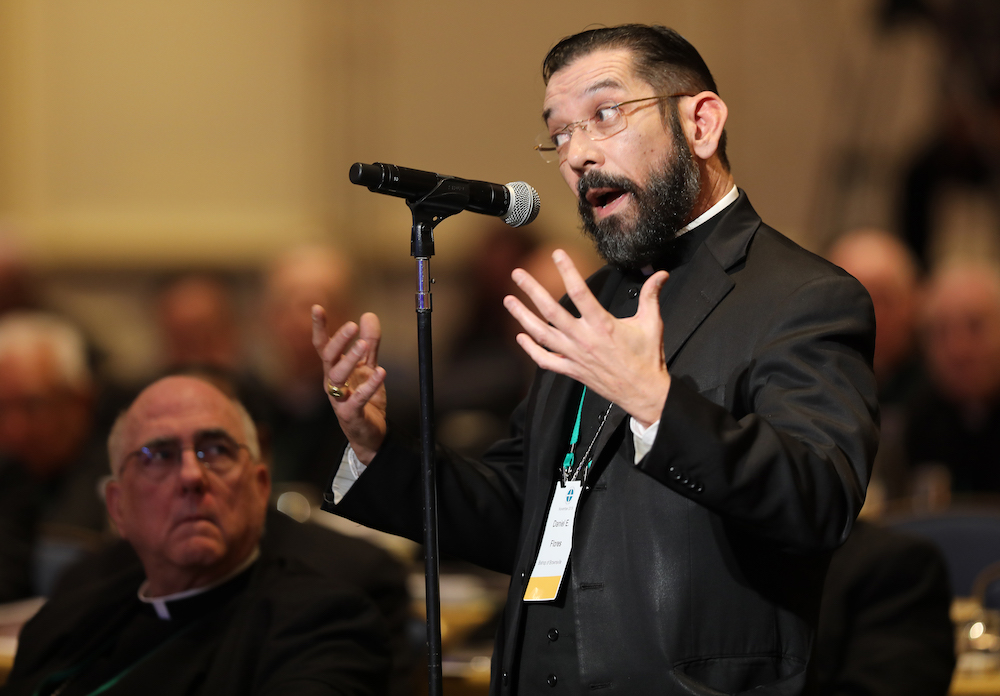While the sex abuse crisis consumed the June meeting of the U.S. Conference of Catholic Bishops in Baltimore, prelates who work on the border, such as Bishop Daniel E. Flores of Brownsville, Texas, have been facing a different crisis also involving children.
In less than a year, at least six children are believed to have died while in the custody of immigration officials along the border. While immigration along the U.S. southern border once involved almost exclusively men looking for work, women with children or entire families are now the ones regularly making the dangerous trek, fleeing poverty and violence.
"I know this gathering has been dominated by the question of abuse and we have to deal with (it)," Bishop Flores said in an interview with Catholic News Service June 12. "It has to be clear that this is something that will not be tolerated."
However, he said, the church also must "express" itself more strongly about its teachings when it comes to migrants and the situation along the border is one affecting the most vulnerable in society, including many children.
"I feel that as a (bishops') conference, we must express ourselves more strongly when it comes to the dignity of immigrants, to say that they are not criminals, that they are vulnerable families and we need to invite all the governments involved, not just the U.S., to defend the migrant as a human being, to not cast the person aside as someone who doesn't matter and is a problem," Bishop Flores said.
Specifically, he was addressing the recent announcement by the government of Mexico that it will take stricter measures to prevent the flow of migrants traveling to the north -- a measure taken to ward off a threat made by U.S. President Donald Trump. The president threatened to place higher tariffs on the country's goods that come into the U.S. unless Mexico does more to prevent migrants from reaching the border.
"Governments shouldn't treat immigrants as pawns, like chess pieces," said Bishop Flores, who also shared recent plans for a new building for a center that will welcome migrants in a dignified way near the border towns of Brownsville and McAllen in Texas. Both towns are part of his diocese.
The center, popularly known as the "respite center," run by Sister Norma Pimentel, executive director of Catholic Charities of the Rio Grande Valley, has gained national attention for its work with recent arrivals, providing food, clothes and helping guide migrants toward loved ones in the U.S. But it also has had to move from about four or five different locations around McAllen for various reasons.
"We're in the final preparations" of choosing a design and making other choices for a permanent building, said Bishop Flores.
Georgetown University has been working with Sister Pimentel, a member of the Missionaries of Jesus, at Catholic Charities to identify an ideal building, along with architects, and also providing guidance in organizing a capital campaign to fund it, said Bishop Flores.
"We want a place that families can enjoy, a safe place where children can wait with their mothers or fathers. ... My dream is for a place that has a little space so that children can play 'futbol' (soccer), something that reminds them of a normal life because what they have gone through is out of the normal, these children and their families," said Bishop Flores. "The poor deserve something beautiful."
Bishop Flores said they also want to build a chapel at the permanent center for the families, honoring what the pope has said, that attention must be paid to the spiritual needs of the poor.
"We're praying so that the Lord will open the way for us," he said. "We're looking at the simple details, spaces for prayer, green spaces. The poor deserve the best that we can do for them."
The June gathering of bishops addressed on the first day the situation of immigration and how the U.S. church is advocating for certain aspects, but there seems to be a struggle with Trump administration officials over humanitarian help and policies that target certain immigrants. Prelates such as Bishop Flores are left to deal with the day-to-day matter of watching the tense situation unfold and the human consequences of government policies made in Washington.
"I know the agenda was tight," he said of the bishops' June meeting. "And there were some important points made, but we as a conference need to call attention to what's being experienced at the border and with these families."

